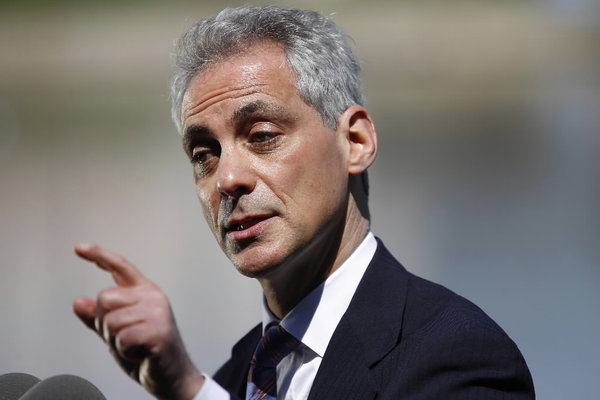
Above all things, Rahm Emanuel's first impression as Chicago's mayor has been his work pace. David Bernstein described it vividly for Chicago:
Notoriously impatient, Emanuel says he wants to go even faster. “If you think this is fast, wait—we’re going to pick up the pace,” he boasts. He is so focused on the job at hand and in such a hurry to get things done that once, when Sean Parker, the billionaire founding president of Facebook, was in town and was taken to meet him, Emanuel, according to a witness, hurried by him without stopping, barely even looking back to tell Parker, “I can’t talk to you now—I’ve got work to do.” Parker, incidentally, had cut Emanuel a $100,000 check for his mayoral candidacy.
Future Chicago Humanities Festival econ lecturer David Brooks:
At any given moment there seems to be six Mayor Emanuels announcing six different initiatives.
The fifth-floor staff uses a football metaphor when describing an average day with the mayor. He’s constantly calling audibles, they say, jumping out of the car unexpectedly for a brisk walk amid surprised pedestrians; stopping unannounced at schools, police precincts, and fire stations; jamming a new meeting into an already overstuffed schedule.
So Bloomberg Businessweek, in its entertaining how-to issue, turned to Mayor Emanuel for advice on how to manage people. It's not all dead fish, he told them:
You have to know the people you work with. Some respond more to encouragement. Some respond better to competitiveness. Some of them need encouragement, enticement, and a little bit of pushing. Sometimes you cajole them. Sometimes you use humor. Sometimes—I don’t want to say scream at them—but you have to be … forceful.
Emanuel's pace and management style seemingly make for great copy. And they do, for this benighted era. But as in all things, except maybe cell phones and baseball on the Internet, we were born too late. Gary Krist, author of the new (and from what I've gotten a chance to read, very good) City of Scoundrels: The 12 Days of Disaster that Gave Birth to Modern Chicago (subject of a recent Chicago feature), passes along a story about Big Bill Thompson that puts Emanuel's "forceful" style into a historical perspective:
Faced with a streetcar strike shortly after his first election, Thompson solved the problem handily—by locking representatives of both sides into his City Hall office. "I'm not going to let them leave," the Mayor told reporters, "until they make peace." Negotiations went on through the night, interrupted only when Big Bill took everyone into his lavatory to race his prize model sailboat in the bathtub. And when the doors opened at dawn, the strike was settled.
Kidnapping City Hall is a striking management method. Making them watch you play with your model sailboat in the bathtub is just baller. Something for the current mayor to consider as a CPS strike looms.
Photograph: Chicago Tribune


